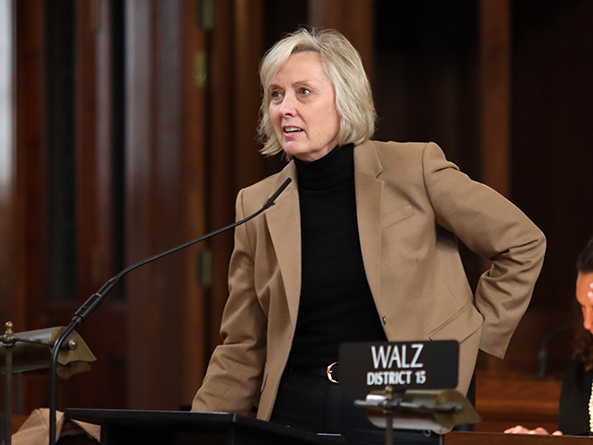Teacher recruitment, retention bill advanced
Lawmakers gave first-round approval March 21 to a bill that would establish a statewide expansion program to recruit, train and support computer science and technology teachers after expanding it to become an omnibus recruitment and retention measure.

LB1284, introduced by Fremont Sen. Lynne Walz, aims to provide funding and resources to implement the provisions of the Computer Science and Technology Education Act, which the Legislature passed in 2022.
Walz said finding a way to implement the act was a priority for her this year because of the opportunities computer science and technology education can give students.
“Not only does [the bill] ensure that every student across our state is afforded the opportunity to receive computer science education, but it also helps fight [the] brain drain our state is facing and can bring in really good-paying jobs,” Walz said.
The bill would require the state Department of Education to employ or contract with computer science specialists to develop and deliver computer science educator training for teachers. The training would be accessible to all teachers in the state, including those seeking supplemental computer science certification.
The bill also would establish the Computer Science and Technology Education Fund, which the department would administer. The fund would receive $1.5 million in state general funds for fiscal year 2025-26 and FY2026-27. Each year after, the state would match up to $500,000, contingent on private donations.
An Education Committee amendment would add provisions from nine other bills related to the state’s efforts to recruit and retain teachers:
● LB964, introduced by Lincoln Sen. George Dungan, which would adopt the Special Education Teacher Forgivable Loan Program Act and provide University of Nebraska and Nebraska State College System students with forgivable tuition loans for up to five years in exchange for their commitment to teach special education at a Nebraska elementary or secondary school;
● LB985, introduced by Elkhorn Sen. Lou Ann Linehan, which would clarify that eligibility for the Nebraska Teacher Recruitment and Retention Act also requires that an applicant teach in the area of their high-need certification;
● LB986, introduced by Linehan, which would amend the Teach in Nebraska Today Act to increase the maximum grant total awarded each year from $5 million to $10 million;
● LB1005, introduced by Walz, which would provide technical changes in order to carry out provisions of a 2023 Education Committee omnibus bill;
● LB1014, also introduced by Walz, which would reimburse school districts and educational service units for the cost of contracting with outside agencies to cover required services of school psychologists;
● LB1050, introduced by Lincoln Sen. Danielle Conrad, which would create a pilot program administered by the state Department of Education to provide school districts with free menstrual products;
● LB1238, introduced by Walz, which would establish the Special Educators of Tomorrow Act and provide scholarships and loans to individuals who work as direct support professionals to become teachers certified in special education;
● LB1253, introduced by Linehan, which would provide up to $1 million in grants to research the use of artificial-intelligence-based writing assistance for individuals with dyslexia, which teachers could use to develop a comprehensive literacy plan; and
● LB1254, also introduced by Linehan, which would provide funding to the Nebraska Department of Education to create reading improvement mentorship programs that focus on developing the science of reading skills and employ regional coaches to assist teachers with reading instruction.
Bayard Sen. Steve Erdman opposed the amendment. He said the cost of implementing LB1284 would exceed the amount of money that the Appropriations Committee has allocated for bills anticipated to pass this legislative session.
“I’m not opposed to where the funds go,” Erdman said. “I’m opposed to where the funds come from.”
Elmwood Sen. Robert Clements, chairperson of the Appropriations Committee, also opposed the amendment. The package of proposals would significantly increase the bill’s cost and, in turn, could endanger the sustainability of the state’s budget, he said.
Glenvil Sen. Dave Murman, chairperson of the Education Committee, spoke in support of the amendment and the bill. Murman acknowledged that the fiscal impact of LB1284 would be higher than the committee had initially hoped, but said the bill would address several pressing issues facing the state, including a teacher shortage and the need to improve reading proficiency.
The amendment was adopted 25-18 and lawmakers advanced LB1284 to select file on a vote of 28-10.


